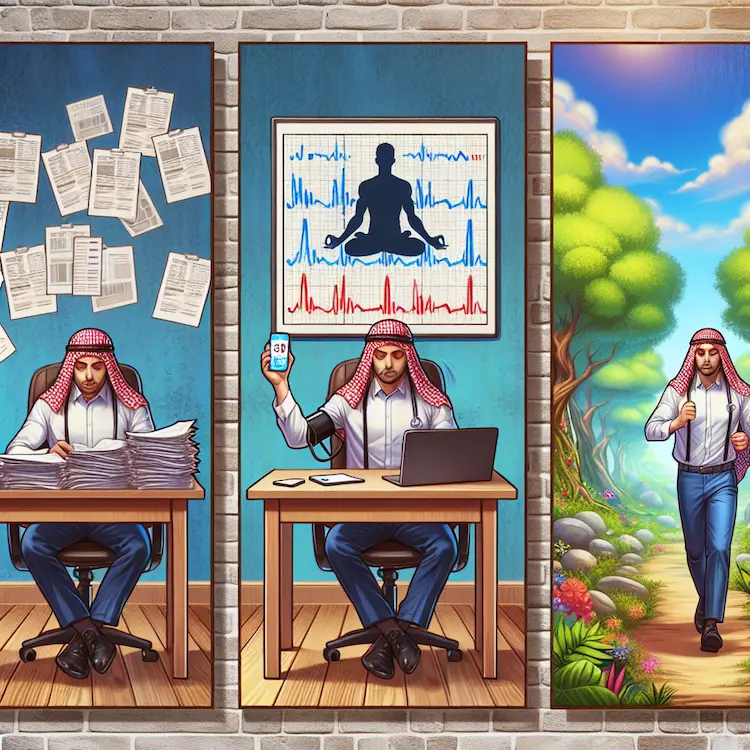Stress is an inevitable part of modern life, affecting millions of people worldwide. While some stress can be beneficial, chronic stress can have detrimental effects on our health, particularly on our cardiovascular system. One of the most significant impacts of stress is its influence on blood pressure, a crucial indicator of heart health. This article delves into the intricate relationship between stress and blood pressure, exploring the mechanisms behind this connection, its potential health implications, and effective strategies for managing both stress and blood pressure.
When we experience stress, our body initiates a complex physiological response known as the “fight or flight” reaction. This response triggers the release of stress hormones, primarily cortisol and adrenaline, which prepare the body to face perceived threats.
The release of stress hormones causes several immediate changes in the body:
These short-term changes are typically harmless and subside once the stressor is removed.
While acute stress causes temporary spikes in blood pressure, chronic stress may lead to more persistent elevations. Research suggests that prolonged exposure to stress hormones can contribute to the development of hypertension (high blood pressure) through various mechanisms:

Studies have shown a correlation between chronic stress and an increased risk of developing hypertension. A significant study published in Hypertension found that individuals with elevated levels of stress hormones in their urine were more likely to develop high blood pressure over a 6.5-year follow-up period.
Several stress-related factors can contribute to the development of hypertension:
When multiple stress-producing factors are present, their combined effect on blood pressure can be multiplicative rather than merely additive.
Chronic stress and persistent hypertension can lead to several cardiovascular complications:
The relationship between stress and blood pressure is bidirectional. While stress can lead to hypertension, living with high blood pressure can also cause significant stress and anxiety, creating a vicious cycle.
Regular blood pressure monitoring is crucial for individuals at risk of hypertension. The table below outlines the classification of blood pressure levels:
| Blood Pressure Category | Systolic (mm Hg) | Diastolic (mm Hg) |
|---|---|---|
| Normal | Less than 120 | Less than 80 |
| Elevated | 120-129 | Less than 80 |
| Hypertension Stage 1 | 130-139 | 80-89 |
| Hypertension Stage 2 | 140 or higher | 90 or higher |
| Hypertensive Crisis | Higher than 180 | Higher than 120 |
Evaluating stress levels can be more challenging due to its subjective nature. However, several tools can help:
Adopting a healthy lifestyle is crucial for managing both stress and blood pressure:
Incorporating stress-reduction practices into daily life can have significant benefits:
In some cases, seeking professional help may be necessary:

Advancements in wearable technology and smartphone apps have made it easier to track both stress levels and blood pressure:
Biofeedback involves using sensors to monitor physiological processes and learn to control them consciously. This approach can be effective for both stress reduction and blood pressure management.
Many organizations are implementing stress management initiatives:
The connection between stress and blood pressure is complex and multifaceted. While acute stress can cause temporary spikes in blood pressure, chronic stress may contribute to the development of persistent hypertension. Understanding this relationship is crucial for maintaining cardiovascular health and overall well-being.
By adopting a holistic approach that combines lifestyle modifications, stress management techniques, and regular monitoring, individuals can effectively manage both their stress levels and blood pressure. It’s important to remember that what works for one person may not work for another, so finding the right combination of strategies may require some experimentation.
As research in this field continues to evolve, new insights and innovative approaches to managing stress and blood pressure are likely to emerge. Staying informed about these developments and working closely with healthcare providers can help individuals take proactive steps towards better heart health and a more balanced life.